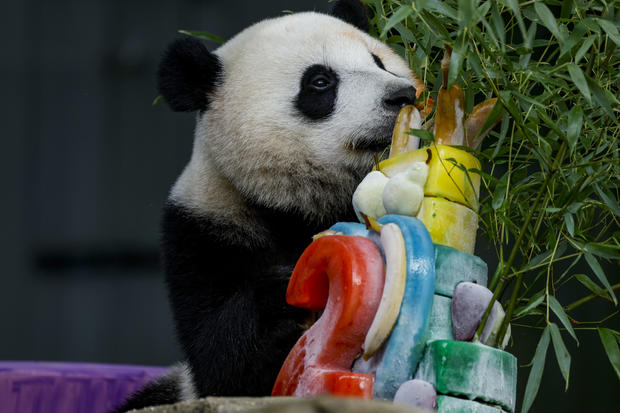The National Zoo in Washington, D.C., returned its beloved pandas to China. Here's why.
It's the end of an era for the Smithsonian National Zoo's beloved giant pandas. The three pandas left the zoo in Washington. D.C. for China on Wednesday, Nov. 8, and after a long flight, landed in Chengdu on Thursday, Nov. 9, the National Zoo said on X.
Giant pandas have been a major attraction there since 1972, when U.S. zoos made an agreement with China Wildlife and Conservation Association.
Two of the pandas, Mei Xiang and Tian Tian, came to the zoo in 2000 as part of the agreement. The pair were meant to stay for just 10 years for a research and breeding program, but the agreement with China was extended several times.
On Aug. 21, 2020, the pair gave birth to a male cub named Xiao Qi Ji. That same year, the zoo announced it signed another three-year extension to keep all three pandas until the end of 2023.
The Smithsonian laid out the plans for the panda family's return ahead of their departure on Wednesday. They explained forklifts would be used to move each of them into FedEx trucks. The trucks then transported them to Dulles International Airport, but said they were not visible in their crates as they were moved onto the "FedEx Panda Express" – a Boeing 777F aircraft with a custom decal.
The zoo shared photos of those crates on Thursday, thanking FedEX. "Mei Xiang, Tian Tian and Xiao Qi Ji have landed in Chengdu! After a safe flight, they are on the way to their new home. Our team will stay for a few days as the pandas get settled. Thank you to @FedEx for transporting our Very Important Pandas in style," the zoo wrote in the post on X.
The National Zoo received its first pandas from China — Hsing-Hsing and Ling-Ling — in 1972 in an effort to save the species by breeding them. The zoo has had panda couples ever since.
Mei Xiang has given birth to seven cubs while at the zoo. Three of her cubs died before adulthood and three have been returned to China; part of the agreement is that they must be returned by age 4. Xiao Qi Ji will remain with his parents at the zoo until they all return to China together.
With these three pandas returning to their homeland, only four giant pandas will be left in the U.S. — all of them at the Atlanta Zoo, which is home to Lun Lun and Yang Yang and their offspring, Ya Lun and Xi Lun.
Per China's agreement with the Atlanta Zoo, the younger cubs will be returned at the end of 2024, and it is expected their parents will return as well. The loan agreement, which was put in place in the mid-1990s, expires in 2024 and the zoo says there has been no discussion to extend it.
The Memphis Zoo and the San Diego Zoo were the only others in the U.S. to have housed giant pandas.
San Diego got its first two pandas for a 100-day visit in 1987. The zoo eventually signed a 12-year agreement and received two pandas, named Bai Yun and Shi Shi, in 1996.
The agreement was extended several times and six pandas were born at the zoo. All of them were returned to China by the end of the agreement, which concluded in 2019.
The Memphis Zoo's 20-year loan agreement with China ended this year and they returned their panda, Ya Yam in April, the Associated Press reported.
The research team at the Memphis Zoo developed an artificial insemination process that allowed one of their male pandas, Le Le, to help pandas across the world conceive babies, the zoo said. Le Le's sperm was frozen and used to inseminate female pandas at other locations, which helped boost the species' population.
Le Le, however, died in February 2023 ahead of the pair's return to China.
Only about 1,864 pandas remain in the wild, mostly in China's Sichuan Province. Breeding programs have been successful and the once-endangered species was upgraded to "vulnerable" by the International Union for Conservation of Nature in 2017, according to the World Wildlife Fund.




